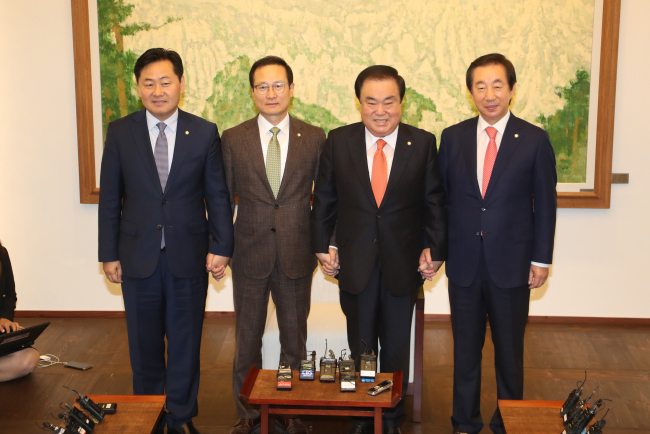The escalating political tit-for-tat over the need for parliamentary approval of the April inter-Korean summit agreement has come to a halt, with the rival parties agreeing Monday to shelve the discussion until after the inter-Korean summit in Pyongyang next week.
The ruling Democratic Party of Korea and opposition parties agreed Monday to suspend the debate over whether lawmakers should endorse the Panmunjom Declaration until after the inter-Korean summit from Sept. 18-20.
Seeking to make a breakthrough in stalled denuclearization talks and inter-Korean economic cooperation, Moon will travel to Pyongyang for his third meeting with North Korean leader Kim Jong-un.
“We reached an agreement not to wage a political fight during the challenging times ahead of the summit,” the Democratic Party’s floor leader Rep. Hong Young-pyo told reporters after meeting with his counterparts from opposition parties.

The main opposition Liberty Korea Party’s floor leader Rep. Kim Sung-tae echoed Hong’s remarks, saying “it is meaningful to reach a consensus and stop unnecessary political fight over parliamentary approval.”
The opposition lawmaker added that if Moon achieves further progress on North Korea’s denuclearization, his party would support the government’s efforts to receive lawmakers’ approval of the Panmunjom Declaration.
Parliamentary approval has thrown the National Assembly into a political stalemate, with rival parties’ lawmakers clashing over the Moon administration’s attempt to seek approval before the inter-Korean summit next week.
Moon and his governing party asserted that the approval would grant more leverage to Moon’s negotiations with Kim. However, opposition parties said more denuclearization progress is needed to support the measure.
“If President Moon brought the parliamentary approved motion to the summit with North Korea, it would make the summit much more trustworthy,” said the Democratic Party’s leader Rep. Lee Hae-chan said during a meeting with party members on Monday.
Presidential office Cheong Wa Dae is planning to submit a motion to seek parliamentary approval of the Panmunjom Declaration on Tuesday, along with a budget plan to implement the declaration, which encompasses inter-Korean infrastructure cooperation, including connecting roads and railways.
Since announcing the declaration at the inter-Korean summit in April, Moon has asserted that parliamentary approval would help South Korea make the case for its demand for North Korea’s denuclearization, whose prospects have been in limbo since stalled talks with the United States.
Moon has argued that the approval could make “irreversible” the agreement reached at the April summit – including inter-Korean economic cooperation and, eventually, North Korea’s denuclearization pledge.
“It’s like sending such a message to North Korea: Since we make the agreement with you irreversible, you have to make the denuclearization pledge irreversible. It can mount pressure on North Korea,” said Kim Kwan-ok, a political science professor at Keimyung University.
But the prospect of passing the motion remains to be seen. The main opposition Liberty Korea Party maintains its opposition and said it will not back down without North Korea’s significant concession on denuclearization.
While North Korea has dismantled its nuclear testing ground and missile engine facilities, there has been no clear sign that it will give up its nuclear weapons. North Korea has criticized the US’ call for complete, verifiable denuclearization, describing it as a “unilateral, gangster-like” demand.
The maine opposition lawmakers also argue that more thorough legislative reviw is required for the taxpayers’ money to be spent on cros-border projects under the Panmunjom Declaration.
“Giving Kim Jong-un a pack of gifts is the least priority for President Moon before next week’s inter-Korean summit,” Liberty Korea Party floor leader Rep. Kim said during a party meeting Monday.
“Given the astronomical cost involving the implementation of the Panmunjom Declaration, President Moon’s attempt to push through parliamentary approval is so dangerous. … I’m so worried about where this nations goes.”
The composition of the legislative body complicates the prospect of parliamentary approval. While the Democratic Party and its allies assume near majority of the 300-member National Assembly, the motion could be blocked by the legislative committee chaired by Liberty Korea Party.
Even if the lawmakers approved of the declaration, experts said its effect are limited to a political gambit for denuclearization talks, expressing doubts it would have a similar binding force to international treaties.
South Korea’s Constitution prescribes that inter-Korean relation are not country-to-country relations, but “unique relations” aiming for reunification. That means signing a binding agreement between the two Koreas is a far-fetched idea under the current law, legal experts said.
“The Constitutional Court has ruled that North Korea has the characteristic of being a partner and an anti-government organization. By that standard, North Korea is not a country,” said Huh Young, a professor emeritus at Kyung Hee University Law School.
By Yeo Jun-suk(jasonyeo@heraldcorp.com)


![[Exclusive] Korean military set to ban iPhones over 'security' concerns](http://res.heraldm.com/phpwas/restmb_idxmake.php?idx=644&simg=/content/image/2024/04/23/20240423050599_0.jpg&u=20240423183955)




![[Pressure points] Leggings in public: Fashion statement or social faux pas?](http://res.heraldm.com/phpwas/restmb_idxmake.php?idx=644&simg=/content/image/2024/04/23/20240423050669_0.jpg&u=)










